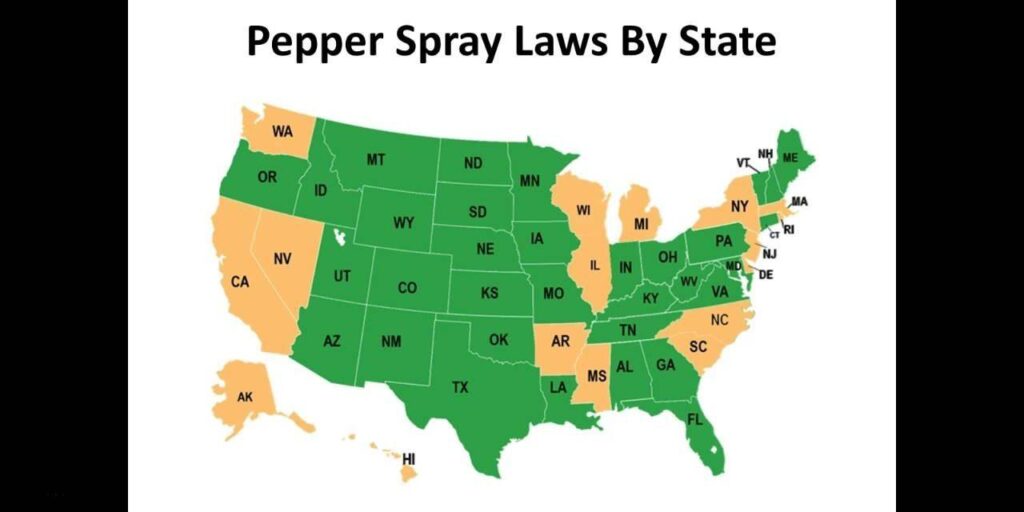Table of Contents
- State Variations in Legal Age Requirements for Pepper Spray Possession
- Understanding Restrictions on Pepper Spray Usage for Minors
- Navigating Purchase and Carrying Guidelines Across States
- Practical Tips for Minors and Guardians to Comply with State Pepper Spray Laws
- Wrapping Up
State Variations in Legal Age Requirements for Pepper Spray Possession
Across the United States, the legal age to possess pepper spray varies significantly, reflecting differing state priorities on self-defense for minors. Some states permit individuals as young as 14 years old to carry pepper spray without restrictions, viewing it as a reasonable safety precaution. Others set the minimum age at 18, aligning with the age of majority. A few states require parental consent or impose additional restrictions for those under the legal age, ensuring responsible use and limiting access to minors deemed too young to handle such devices safely.
It’s critical for teens, parents, and guardians to understand these nuances, especially when traveling or relocating. Common variations in law include:
- Mandatory training or certification before possession is allowed
- Restricted purchase locations such as licensed dealers or pharmacists
- Limitations on the size or strength of the pepper spray unit
- Special conditions or permits required for carrying pepper spray in schools or public buildings
Being informed about these differences not only helps avoid legal complications but also encourages responsible and lawful use of pepper spray as a self-defense tool for minors.
Understanding Restrictions on Pepper Spray Usage for Minors
When it comes to self-defense tools like pepper spray, minors are often subject to stringent regulations that vary widely across states. These regulations can include specific age limits-frequently requiring users to be 18 or older to legally carry or purchase pepper spray. Some jurisdictions permit possession only under parental supervision or mandate that the spray contain a lower concentration of active ingredients to reduce the risk of misuse or accidental harm. Understanding these nuanced rules helps ensure that minors stay within legal boundaries while considering personal safety options.
In addition to age restrictions, states may impose various requirements such as:
- Mandatory registration of pepper spray ownership with local law enforcement.
- A limit on the maximum size or volume of the pepper spray container allowed.
- Prohibitions on carrying pepper spray in certain locations like schools, government buildings, or public transportation.
- Requirements for labeling and packaging that clearly indicate the intended use and safety warnings.
Navigating Purchase and Carrying Guidelines Across States
When it comes to purchasing and carrying pepper spray, minors must navigate a complex web of regulations that vary significantly from one state to another. Some states allow individuals under 18 to buy and carry pepper spray with parental consent or under specific conditions, while others impose strict age restrictions or outright bans for minors. Understanding these nuances is crucial, as violating local laws can lead to legal consequences, including fines or confiscation of the spray. Always verify with your state’s official resources before making a purchase, since legality often hinges on factors like the spray’s composition, the amount allowed, and the intended purpose.
Key considerations for minors interested in carrying pepper spray often include:
- Age requirements: Minimum age limits can range from 16 to 21 years depending on jurisdiction.
- Restrictions on spray content: Some states limit the concentration of active ingredients like oleoresin capsicum.
- Permitted carry locations: Schools, government buildings, and airports frequently have strict prohibitions.
- Parental consent: Explicit written consent may be required for minors to legally possess pepper spray.
Because these details differ widely, consulting state statutes and possibly seeking legal advice can help minors and parents make informed decisions about self-protection within the bounds of the law.
Practical Tips for Minors and Guardians to Comply with State Pepper Spray Laws
Before allowing a minor to carry pepper spray, guardians should first familiarize themselves with the specific state statutes governing possession, age limits, and permissible uses. Many states require users to be a certain age-commonly 18 or older-or to have parental consent if younger. It’s essential to verify whether any registration or permits are needed and if there are restrictions on the spray’s size or concentration. Ensuring compliance often means checking local municipalities as well, since city or county regulations may impose additional controls.
To safely navigate these rules, guardians and minors can follow a few key steps:
- Consult official state or local government websites for the most up-to-date and specific legal requirements.
- Keep documentation handy such as proof of age or consent forms when carrying pepper spray.
- Invest in a product that meets legal standards – check labels for approved ingredients and size limits.
- Educate minors on responsible use including what situations justify deployment and the importance of safety and restraint.
- Store the pepper spray securely when not in use to prevent accidental discharge or access by unauthorized individuals.
Wrapping Up
Understanding the varying state laws regarding minors carrying pepper spray is essential for ensuring safety and staying compliant with legal requirements. As regulations can differ widely-from age restrictions to specific usage guidelines-taking the time to research your state’s stance is a smart and responsible step. Whether you’re a parent, guardian, or a young individual considering pepper spray for personal protection, being informed helps promote safe and lawful choices. Stay updated, stay prepared, and prioritize safety above all.Check Our Other Blogs
- StunGun – Your Trusted Source for Stun Guns, Laws, and Self-Defense Tips
- PepperSprayLaws – Your Trusted Resource for Pepper Spray Information
- StunGunLaws – Your Trusted Guide to Stun Gun Legality and Safety




